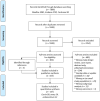Fertility-Sparing Surgery in Gynecologic Cancer: A Systematic Review
- PMID: 33670929
- PMCID: PMC7975326
- DOI: 10.3390/cancers13051008
Fertility-Sparing Surgery in Gynecologic Cancer: A Systematic Review
Abstract
Fertility-sparing surgery (FSS) is increasingly being offered to women with a gynecological malignancy who wish to preserve fertility. In this systematic review, we evaluate the best evidence currently available on oncological and reproductive outcome after FSS for early stage cervical cancer, epithelial ovarian cancer, and endometrial cancer. An extensive literature search was conducted using the electronic databases Medline (OVID), Embase, and Cochrane Library to identify eligible studies published up to December 2020. In total, 153 studies were included with 7544, 3944, and 1229 patients who underwent FSS for cervical, ovarian, and endometrial cancer, respectively. We assessed the different FSS techniques that are available to preserve fertility, i.e., omitting removal of the uterine body and preserving at least one ovary. Overall, recurrence rates after FSS are reassuring and therefore, these conservative procedures seem oncologically safe in the current selection of patients with low-stage and low-grade disease. However, generalized conclusions should be made with caution due to the methodology of available studies, i.e., mostly retrospective cohort studies with a heterogeneous patient population, inducing selection bias. Moreover, about half of patients do not pursue pregnancy despite FSS and the reasons for these decisions have not yet been well studied. International collaboration will facilitate the collection of solid evidence on FSS and the related decision-making process to optimize patient selection and counseling.
Keywords: adolescents and young adults; cervical cancer; conization; endometrial cancer; fertility-sparing surgery; hormonal therapy; ovarian cancer; trachelectomy.
Conflict of interest statement
The authors declare no conflict of interest.
Figures
References
-
- World Health Organization, International Agency for Research on Cancer (IARC), Global Cancer Observatory (GCO) [(accessed on 17 November 2020)]; Available online: https://gco.iarc.fr.
-
- The Netherlands Cancer Registry, the Netherlands Comprehensive Cancer Organisation (IKNL) [(accessed on 17 November 2020)]; Available online: https://www.iknl.nl/netherlands-cancer-registry.
-
- Prodromidou A., Iavazzo C., Fotiou A., Psomiadou V., Douligeris A., Vorgias G., Kalinoglou N. Short- and long term outcomes after abdominal radical trachelectomy versus radical hysterectomy for early stage cervical cancer: A systematic review of the literature and meta-analysis. Arch. Gynecol. Obstet. 2019;300:25–31. doi: 10.1007/s00404-019-05176-y. - DOI - PubMed
Publication types
LinkOut - more resources
Full Text Sources
Other Literature Sources



